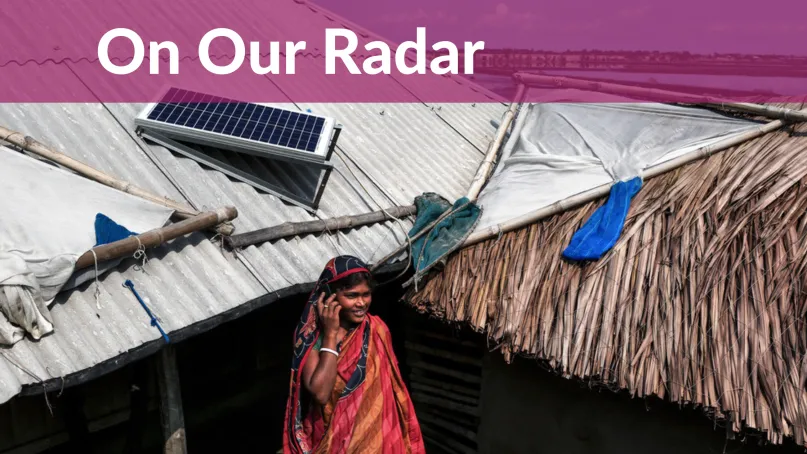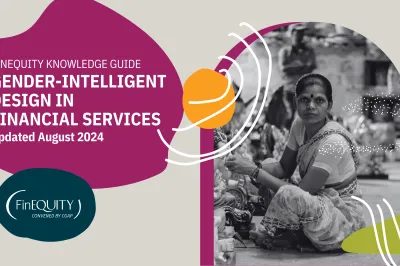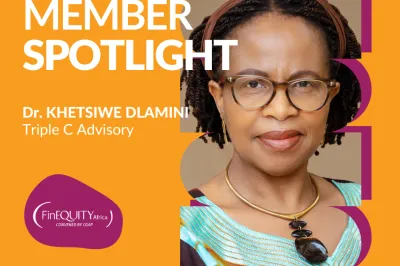On Our Radar: August 2024

An updated take on "What We're Reading". The FinEquity Africa team brings you a curated list of women's financial inclusion and economic empowerment content we've been consuming recently, from podcasts, new initiatives and articles to videos and social posts.
On Our Radar
Empowering Women: Impact Evaluation Insights into Labor Force Participation and Economic Inclusion
Despite significant progress in recent years, achieving gender equality in economic participation remains an aspiration rather than reality for women around the world, as numerous barriers persist, hindering their full inclusion in the workforce. The challenges are complex and multifaceted, ranging from violence against women (VAW) to systemic barriers that limit access to opportunities and enabling resources. This blog provides an interesting literature review on conditions for female labor force participation and highlights the need for targeted interventions to dismantle systemic barriers.
Australian Businesses Pledge to Stand Against Financial Abuse
Some of Australia’s biggest businesses have joined #respectandprotect - an initiative of social enterprise Flequity Ventures - that aims to mobilize the private sector against perpetrators of financial abuse. To date 28 businesses have agreed to update their terms and conditions to ban the misuse of their products and services as a tactic of coercive control. Combined, the businesses have more than 15 million customers across banking, insurance, superannuation, telecommunications, water, education and fintech. The aim is to lift the standard of acceptable customer behavior so that no business inadvertently enables financial abuse. Any business around the world can join the first movers. You can find out more, pledge your support or nominate a business. Find out more about this initiative.
IFC Launches First-of-its-kind Program to Support Financial Institutions in Addressing Financial Abuse
To support financial institutions in addressing financial abuse, IFC launched 'Empower Finance', an 18-month program implemented with support from the Government of Australia. Through this initiative, IFC will convene nine financial institutions across five countries collectively serving more than 30 million customers in Asia and the Pacific and global experts in financial-abuse prevention to share information and best practice and introduce the tools and solutions to better protect customers and financial institutions. Empower Finance – which comprises financial institutions from Nepal, Papua New Guinea, Sri Lanka, Vanuatu and Viet Nam – will promote universal principles to guide the development of safe banking products and services, which will help to minimize potential risks from financial abuse.
Making Ethiopia's Financial Sector Work for Women: 10 Evidence Based Ideas
This document suggests 10 concrete, evidence-based ideas for action. The ideas are based on a review of the available evidence, from Ethiopia and beyond,on ‘what works’ in closing key gender gaps in the use of financial services. They also take into account recent data on financial inclusion in the country as well as current policy priorities, especially those expressed in the National Bank of Ethiopia’s National Financial Inclusion Strategy. The ideas are grouped into four thematic sections: advancing women’s careers in finance; closing gender gaps inaccess to credit; closing gender gaps in the use of digital financial services; and regulating for women’s financial inclusion. Some of them can be put into action by Ethiopia’s banks and microfinance institutions, others by the central bank, digital financial service providers or development partners.
Accelerating Financial Inclusion in Nigeria: Six Key Insights from the 2024 National Savings Group Conference
The 2024 National Savings Group Conference in Nigeria, organized by CARE Nigeria and the Savings Group Implementers Platform (SGIP), highlighted the critical role of Savings Groups in accelerating financial and economic inclusion. The event brought together over 500 participants from diverse sectors, including private organizations, NGOs, CSOs, government institutions, and international bodies, to discuss challenges and opportunities in scaling Savings Groups across Nigeria. The conference provided a platform for cross-country learning exchanges, with representatives from Sierra Leone, Ghana, Cote d’Ivoire, Niger, and Uganda sharing insights and experiences. Additionally, discussions between the Uganda Microfinance Regulatory Authority (UMRA) and the Central Bank of Nigeria (CBN) opened avenues for potential regulatory frameworks for Savings Groups in Nigeria, emphasizing the pivotal role of savings groups in accelerating financial and economic inclusion in Nigeria, particularly for women. This report shares six key insights from the conference.
Pathways to Climate-Resilient Economic Inclusion: A Framework for Integrating Climate Action in Economic Inclusion Programs
Climate change disproportionately impacts already vulnerable people and threatens to plunge 132 million more people into extreme poverty by the end of this decade. But significant opportunities exist to align climate action with economic inclusion efforts, especially since more than 90 million individuals across 75 countries are already benefitting from economic inclusion programs directly or indirectly. While ending poverty is increasingly seen as a vital part of managing climate risks, practical insights on how to advance climate-resilient economic inclusion remain limited. This publication explores the links between climate change and economic inclusion and proposes pathways through which economic inclusion programs can more strategically support climate resilience for disadvantaged and vulnerable groups, especially women, who often face greater exposure to risk and loss of livelihoods. It also presents a framework for climate-resilient economic inclusion that can help inform the design of both existing and new programs.
Bridging the Gap with Parametric Insurance: A Path to Resilience in Developing Countries
Natural hazards caused $380 billion in economic losses last year and less than a third of those losses were covered by insurance. As climate-related shocks increase, solutions that help those affected by natural hazards recover and rebuild more quickly are crucial. One option? Parametric insurance. Parametric insurance pays policyholders a predetermined amount based on the occurrence of a specific “trigger" event, like flooding or extreme heat. Because the payouts are based on predetermined parameters—such as rainfall levels or heat indexes—rather than actual damages, the claims process moves faster and is less costly to manage. Through the USAID Climate Finance for Development Accelerator (CFDA), USAID recently awarded four grants to companies working across the parametric insurance space. This blog showcases the work of these grantees to support climate adaptation.


